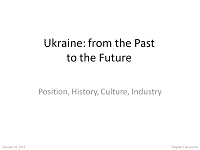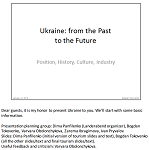Since December 2013 Russian state mass-media were supporting the former president of Ukraine V. Yanukovych and his criminal, authoritarian kleptocracy.
Manipulating and distorting facts, and even making up fictitious “events”, Russian state mass-media (and personally Dmitri Kiselyov) tried very hard to depict protesters in the least favorable light possible – as violent gangsters, thugs, fascists, attackers of innocent policemen. (Dmitri Kiselyov, apparently for his fervent propaganda services, was promoted by Putin to become the head of the newly-created Russian state news agency.)
Russian state mass-media never reported about kidnapped and tortured and murdered protesters, protesters who lost eyes after being shot to the head with rubber bullets, heavily beaten protesters with broken ribs and internal organs rupture.
They also somehow failed to notice that after the night of November, 30, 2013, the protests were no longer about the EU association treaty, but about the responsibility of those guilty of badly exceeding authority during the night beatings of protesters in Kyiv.
Further escalation of the crisis and street protests was always the (delayed) consequence of authorities using illegally excessive force against the protesters. After the “Party of regions” tried to basically forbid the entire protest movement with a set of laws in mid-January (while the president-controlled police and prosecutors office were opening hundreds of criminal prosecution cases against the protesters), Euromaidan, out of well-understandable desperation, escalated into open fighting with the now-disbanded “Berkut” special police forces. The Russian propaganda machine was omitting causal events, while depicting the protesters’ response to (unrevealed) oppression, and this was probably the least disgusting technique used.
Further Yanukovych actions made crystal-clear the primary reason for strong Russian media support: Yanukovych response to the protests was fully coordinated with (and, highly likely, suggested or even ordered by) Moscow. Multiple pieces of evidence support this claim, I’ll only mention two:
- according to, if I remember correctly, Inna Bohoslovska (member of parliament, the former president’s “Party of regions” faction), every time after tension-decreasing agreements were negotiated and nearly finalized between the former president and opposition leaders (who were representing protesters), the phone call to Moscow followed, after which negotiations were aborted without finalizing any agreements;
- when the EU officials had a night-long negotiation with Yanukovych, discussing ways out of the crisis, Yanukovych interrupted negotiations to call Putin.
Clearly, Yanukovych was good for Putin because he was, in fact, a nearly-puppet “president”. Had Yanukovych survived the crisis, the 2015 presidential elections in Ukraine would be as clear and honest as the Crimean referendum, most likely extending Yanukovych presidency for the 2nd term. He could have then followed in the steps of the presidents of Belarus or Kazakhstan (who keep being presidents for many years and even decades). A controllable president of Ukraine was a clear win for Putin, and he didn’t care (and still doesn’t care, of course) about the citizens of Ukraine.
But I digress, as there is indeed a lot to write on the subject. When the Russian military invasion into Ukraine started at the end of February, Russian mass-media kept generating propaganda; now it had the goal to help Putin gain support inside Russia, to brainwash the citizens of Russian Federation (and, to a certain extent, the Russian-speaking Ukrainian citizens who haven’t yet realized that Russian mass-media are poisonous) into believing in (totally ungrounded) scary tales about the hardships and life-threatening conditions of Russian-speaking people in Ukraine.
To counter Russian propaganda, a group of journalists and volunteers created an anti-propaganda, anti-lies website StopFake.org, which collects lies from Russian mass-media and finds materials proving those are indeed lies.
Rule of thumb: don’t trust Russian media.
Especially when they are talking about Ukraine.


